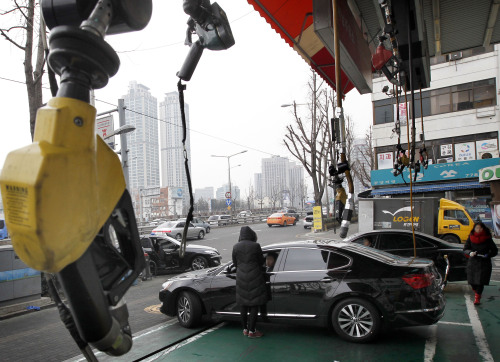With crude prices spiraling out of control amid tensions surrounding Iran, concerns are surfacing of a fresh oil shock.
Korea’s benchmark Dubai crude jumped to $121.57 a barrel, the highest since August 2008, on Singapore’s spot market on Friday. Brent crude, a global yardstick, touched a nine-month high of $125 a barrel.
Korea, the world’s fifth-largest crude buyer, imports almost of its oil needs.
Runaway fuel costs are threatening to push up consumer prices and in turn jeopardize the central bank’s 3.2 percent inflation target for the year, Finance Minister Bahk Jae-wan suggested on Saturday.
Korea’s benchmark Dubai crude jumped to $121.57 a barrel, the highest since August 2008, on Singapore’s spot market on Friday. Brent crude, a global yardstick, touched a nine-month high of $125 a barrel.
Korea, the world’s fifth-largest crude buyer, imports almost of its oil needs.
Runaway fuel costs are threatening to push up consumer prices and in turn jeopardize the central bank’s 3.2 percent inflation target for the year, Finance Minister Bahk Jae-wan suggested on Saturday.

“Oil prices have an extensive impact on the Korean economy,” said Bahk, who was attending a meeting of the Group of 20 finance ministers in Mexico.
“It’s one of the government’s biggest priorities to contain inflation as much as possible. We are hoping to reach the 3.2 percent target or stay even lower.”
Retail prices of gasoline hit an all-time high of 1993.82 won per liter on Friday on the back of growing tensions between Iran and the West, as well as supply disruptions in countries like Syria, Yemen and Sudan. Regular unleaded petrol was sold at an average 2,070.01 won per liter at pumps in Seoul, according to the state-run Korean National Oil Corp.
Though a strengthening local currency is lifting some of the burden, Korean exporters are rushing to craft measures to cut costs and boost productivity to offset surging raw material and distribution expenses.
The Korean won reached its strongest point since November on Feb. 9 as the stock market rallied and government bonds fell. But it slid to a one-week low of 1,129 won per U.S. dollar on Friday on escalated tensions, snapping this year’s advance to 3.1 percent.
Among the hardest hit are airlines and shipping businesses, which are striving to keep engines clean to boost performance and maintain a fuel-efficient speed. Fuel accounts for more than 30 percent and 20 percent of their budgets now, respectively, the companies say.
Shares in Korean Air and Asiana Airlines remained listless all week long despite robust gains over the last two months. Hanjin Shipping and STX Pan Ocean each shed 10.3 percent and 9.5 percent last week.
Still, they could still mark up the prices of their goods and services if the upward trend in oil prices persists, heaping further pressure on low-income earners.
In the worst case scenario, the Korea Energy Economics Institute forecasts that Dubai crude could momentarily shoot up to $180 a barrel, or average $135 for the whole of 2012.
However, Lee Kwang-woo, a researcher at LG Economic Research Institute, said the political instability in oil producing nations will likely have a limited impact on oil prices in the long term.
“Iran will try avoiding a worst-case scenario that could endanger its economy and lock itself into international isolation,” Lee said in a report.
“At the same time, the U.S. is unlikely to seek an escalation in tension at a time when it’s struggling with its debt problem and an economic slowdown.”
The Korean economy expanded a meager 0.4 percent in the fourth quarter of 2011 from the previous quarter, hurt by the prolonged eurozone debt crisis. Its trade account in January also swung to a deficit of $1.95 billion as exports dropped. The Bank of Korea projected the economy would grow 3.7 percent this year.
By Shin Hyon-hee (heeshin@heraldcorp.com)










![[Hello India] Hyundai Motor vows to boost 'clean mobility' in India](http://res.heraldm.com/phpwas/restmb_idxmake.php?idx=644&simg=/content/image/2024/04/25/20240425050672_0.jpg&u=)








